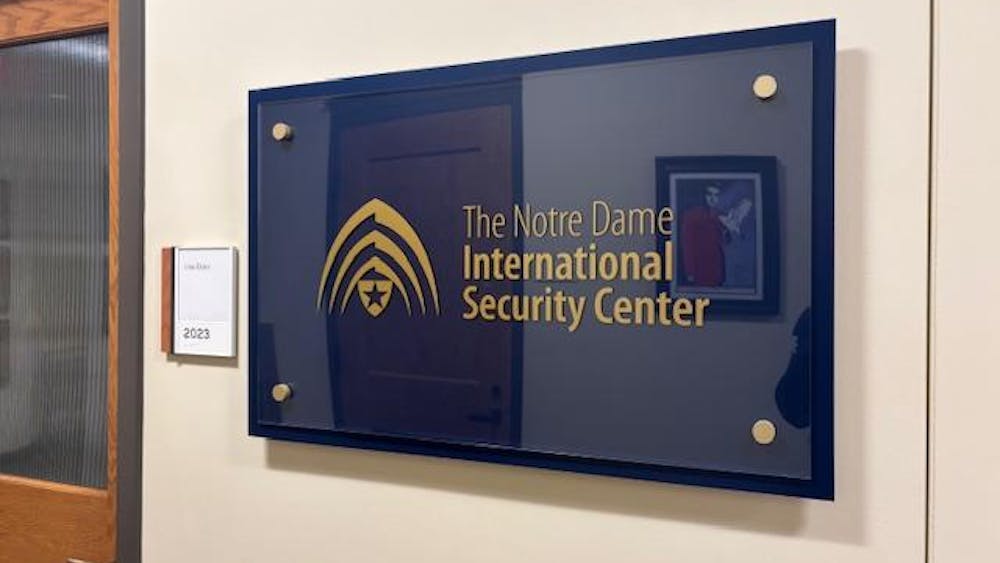Three panelists explored bisexual and transgender experiences from a variety of perspectives in a discussion titled "What About the 'B' and the 'T'?" PrismND included this talk as part of its StaND Against Hate Week, a series of events meant to increase awareness of the issues faced by the LGBTQ community.
Dr. Abigail Palko, director of undergraduate studies in the gender studies department, offered an academic perspective on experiences of bisexual and transgender individuals. In the past several decades, she said understanding of bisexuality has evolved, from defining it in terms of bisexual acts to defining it in terms of the inclinations or emotions of bisexual people.
"We have this tendency to assume that your partner of the moment is a sign of what your orientation is, so that you know my partner is a man, and you see me as a woman, you would assume I am heterosexual," she said. "But if I am bisexual, how do I get you to know what I am if it's important to me that you read that part of my identity properly, if it's only judged by partner?"
Similarly, Palko said, the term "transgender" also means different things to different people. The medical definition of transgender has also evolved, but the responses to it have not kept pace, leading to, she said, a "double-bind" for transgendered people.
Palko said ways to support the transgender community included "bathroom activism," or understanding how norms such as non-gender-neutral restrooms could exclude transgendered individuals, and a greater awareness of how people ask questions about sexual intimacy - and its appropriateness.
"[Sex is] meant to be an expression of human connection between two people, so the answer that I try to remember to always give is that the experience of sexual activity for transgender people, just like for cisgender people - that's where the sex you were given at birth matches your gender identity - is always defined by the two bodies engaged in it, and the two people inhabiting those bodies," she said.
Dr. Jan Poorman, director of formation and field education in the department of theology, offered a theological perspective on the bisexual and transgender experience, saying the Catholic Church's teachings on homosexuality are often misunderstood.
Drawing from a number of Catholic church documents, she said while the Church holds that homosexual acts are "objectively disordered" because they do not indicate a relationship between a man and a woman or lead to the procreation of children, homosexual and bisexual people themselves are not disordered, sinful or rejected by God.
Quoting from the Catechism, she said while transgender "just is," the Church technically holds that gender-reassignment procedures are immoral because they change the self through mutilation or sterilization.
"The irony is that this teaching comes from - talk about distorting church teaching - a section that is about kidnapping and hostage-taking and reigns of terror and terrorism and torture of other people," Poorman said. "We really should not be terrorizing people by amputating their limbs and mutilating them and sterilizing them - and who's not going to agree with that? So there's not really a lot of good stuff."
Poorman said the church is, however, learning from medicine and psychology that people occupy a spectrum of genders rather than a dichotomy of two biological sexes.
"We must rethink what we say about the immorality of those medically necessary procedures and processes that people feel must undergo oftentimes without even knowing all the medical reasons underlie the sense that they do not belong in their bodies," Poorman said.
Dr. Maureen Lafferty, assistant director for training and staff psychologist at the University Counseling Center, spoke about her own experience as a bisexual woman and emphasized the ambiguity and negative connotations associated with the word "bisexual."
"The classic [saying] in the lesbian community is, 'don't get involved with a bisexual woman because she will dump you for man,' and that is really just too much. Even though [the generalizations] have been around forever, I don't think they're gone. I still [see] them," she said.
Developing a bisexual identity, Lafferty said, could therefore be "less linear" than the similar process of a gay or lesbian person and include exploration, delay and confusion.
"It's a both-and option in an either-or world," she said.
Lafferty said bisexual people can often feel excluded from the straight and gay communities as well as face misunderstanding and homophobia before achieving self and community acceptance.
"It's being able to find the community and then within the community find people that seem to resonate to your experience and seem to understand or support or at least be curious about or interested in your experience and creating space there," she said.
Lafferty said that there are, however, psychological advantages to being bisexual.
"I think sometimes folks who identify as bi or experience the world as a both-and world can bring the perspective that perhaps love is not based on gender, that perhaps what we have in common is more important than what separates us and that things are complicated," she said. "Folks who are bi, they sometimes have a special angle on multiple identities, the fact that we are very interesting people."
Lafferty said that bringing bisexual and transgender issues, which still are not treated ideally in the medical world and which often make people react in a "fearful" way, into everyday discussion is how students can support LGBT individuals.
Contact Emily McConville at emcconv1@nd.edu









